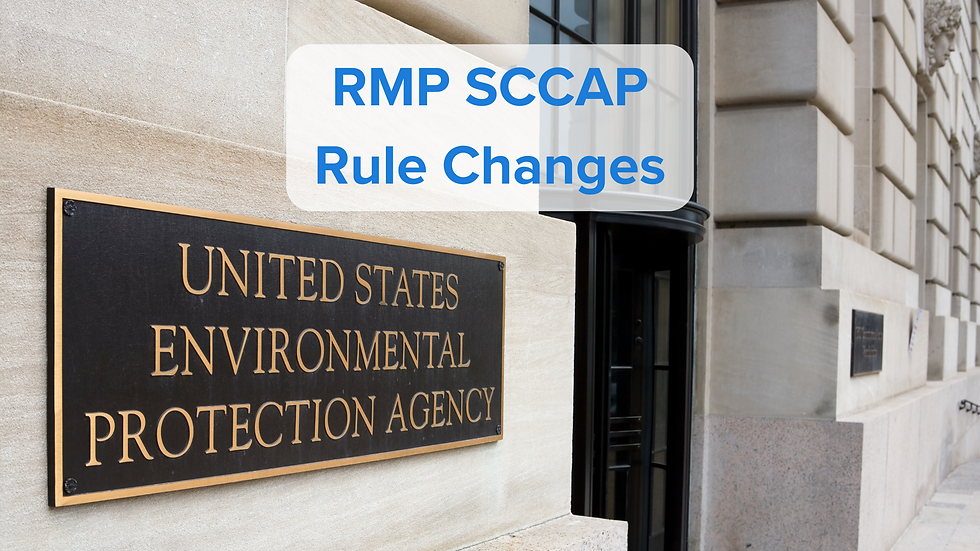The RMP SCCAP Rule Changes are Effective Today: May 10, 2024 | Blog No. 28
- Eli Macha, CEO

- May 10, 2024
- 3 min read

Summary
On February 27, 2024, the EPA completed the Safer Communities by Chemical Accident Prevention (SCCAP) rule, intending to, “protect vulnerable communities from chemical accidents, especially those living near facilities in industry sectors with high accident rates.” This rule incorporates substantial revisions to the Risk Management Program (Title 40 CFR Part 68), introducing new measures to enhance community protection from chemical accidents. These measures include the identification and implementation of safer technologies and chemical alternatives, stringent incident investigations, third-party compliance audits, and improved emergency preparedness. The overall objective is to reduce the frequency of chemical releases and mitigate their adverse impacts on neighboring communities.
History
In January 2017, the RMP Amendments Final Rule introduced new accident prevention, response, and public disclosure requirements. However, several key provisions were delayed, and many never became effective. Subsequently, the 2019 RMP Reconsideration Final Rule rescinded or modified certain measures from the 2017 rule. The proposed Safer Communities by Chemical Accident Prevention rule was released in August 2022, setting the stage for the SCCAP Rule. The SCCAP Rule was posted in the Federal Register on March 11, 2024 (89 FR 17622). The final rule changes become effective today, May 10, 2024.
Important Changes
While the publication in the Federal Register amounts to 71 pages, here is a high-level overview of the changes:
Petrochem facilities within one (1) mile of another petrochem facility are required to do safer technology and alternatives analysis (STAA) as part of their process hazard analysis.
Incident investigations need to have a root cause analysis, and this is defined as, “a fundamental, underlying, system-related reason why an incident occurred that identifies a correctable failure(s) in management systems and, if applicable, in process design.”
Prior to today, compliance audits could be completed entirely in-house. Now, if a facility has a qualifying accident within the past five years, compliance audits will need to be completed by a competent and independent third-party.
Facilities must now consult with employees regarding the resolution of PHA, compliance audit, and incident investigation recommendations.
Select operators (i.e., knowledgeable in the process) must be given certain stop work authority.
Facilities must allow for anonymous reports from employees. Whether anonymous or not, these reports must be maintained for three (3) years.
Employees were already entitled to select program information (e.g., PHA reports), but more deliberate effort must now be made to share information with employees.
Members of the public residing, working, or spending significant time in a 6-mile radius from the fence line of the facility may now request information regarding the facility’s RMP and emergency response programs.
Facilities must now perform a RAGAGEP (recognized and generally accepted good engineering practices) analysis in order to identify any gaps between practices related to the facility's design, maintenance, and operation, and the most current version of RAGAGEP.
Hot work permits must now be retained for three (3) years.
Standby or backup power for air monitoring and control equipment must be installed.
Timeline
While the changes to the RMP regulation went into effect today, May 10, 2024, most of the requirements from the changes do not go into effect for three (3) years. (No changes go into effect sooner than three years.) Today starts the three-year clock, which means the changes will need to be implemented by May 10, 2027. While three (3) years may seem like a long time, with the breadth of all these changes, it is recommended to start updating your programs.
As mentioned, this is a very high-level overview of the SCCAP Rule. Each of these new requirements will be broken down and explained in future blogs. Subscribe today to stay updated on these important changes.






Comments